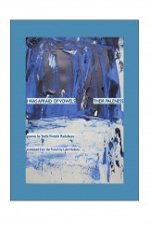Review | I Was Afraid of Vowels . . . Their Paleness, by Stella Vinitchi Radulescu
(trans. Luke Hankins)
Q Ave Press, 2011
 |
This selection of Radulescu’s poems seems to require translation as a fulfillment of its own project, one that claims the vigor of language as image, a synesthetic trope that appears as early as the first poem with “it’s not a word not yet this vapor / escaping my mouth” and elsewhere: “we will taste what is written / on these lips.” But the elements of language do not merely populate the poems—enriching if not confusing the readers’ senses—their inclusion allows Radulescu to speak to the transience of language, the ways in which denotation dissolves, and each speaker, and perhaps reader, moves into words, the hard rigid shells we inhabit with meaning:
the snow will melt I will be silent
you will cheep in your tombs the verbs
will roll freely on the page someone
will speak like a god something
will be called a city
or sand
we will seek shelter in a conch
. . . .
almost imperceptible . . .
It’s here that the work invites the act of translation: the original writer steps away and the language moves on its own accord, and “something”—a word—“will be called”—translated to—“a city.”
But, forgoing a quixotic meta-reading of the text, the reader finds that Radulescu’s speakers often distance themselves not only from the voice in the poems, after they are written, but also from the life within:
no it’s not me here for quite some time
someone has enjoyed inhabiting my days
and my nights
This detachment, however, avoids a Larkinesque acrimony of isolation. Instead, the speaker hovers just above her body, her actions, her life, in the way one might dream of watching the sleeping self. “[C]ome forward,” she urges in “ghost of a day,” a poem whose dramatic undertones suggest the speaker plays the role of a medium; the ghost, however, embodies not an incarnation of a spirit but rather the phantoms of the self and the lover, now dissolved or merely kept secret and, therefore, not fully actualized:
your furtive lover’s gesture
caught in the web of the gaze the spider
and its cross
celestial linens on the unmade bed
: light
that appears rumpled
The calm of these poems, in part, arises from their form—little punctuation, all lowercase, padded with white space—and Hankins, in translation, preserves much of the formatting from the original French, which appears alongside the English versions. That said, there are moments when he nuances the form to capture the emphasis necessary in English, as in “children of the fog.” The French version, “enfants du brouillard,” ends:
la rose le romarin
But Hankins inserts a bijou of white space to slow our reading:
rose rosemary
Though a small change, its presence urges the reader to consider the English poem as distinct from the French. In Hankins’s introduction, he quotes Radulescu on her perception of detachment between languages: “I feel, think, act, perceive, smell, touch differently according to the language I write in,” she says, and yet, each poem possesses the same emotional and tonal core—life—within its shell, “this snail that hides itself in the shell of my life.” We can admire both Hankins’s translations and the originals even if we may not be able to inhabit the latter with meaning.
Q Ave publishes chapbooks of translations as well those of single authors, art-poem collaborations, and anthologies. Although this chapbook has a folio quality—unpaginated, stapled, with a slightly uneven binding and, surprisingly, a gesture of French flaps—the cover design with a painting of Marie-Thérèse Pent—an abstract of heavy blues, charcoal, and white overlaid with bands of pale blue, suggestive of white-out, on which the title and author information sit—complements the mood as well as the appearance of the poems. Both the look of chapbook and the poems seem at once redacted, calm, and yet suggestive toward a cohesive aesthetic into which the reader can submerge for thirty-six pages. ![]()
Stella Vinitchi Radulescu is the author of five collections of poetry, most recently All Seeds & Blues (CW Books, 2011). She is the author of one chapbook, I Was Afraid of the Vowels . . . Their Paleness (Q Ave Press, 2011).
Luke Hankins is the translator of Stella Vinitchi Radulescu’s I Was Afraid of Vowels . . . Their Paleness (Q Ave Press, 2011). He is the author of one collection of poetry, Weak Devotions (Wipf & Stock Publishers, 2011), and the editor of a forthcoming anthology, Poems of Devotion (Wipf & Stock Publishers). Hankins is the senior editor of Asheville Poetry Review.